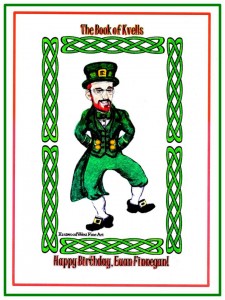Victorian Venereality
Posted in General, On This Day on October 6th, 2010 by Eugene Finerman – Be the first to commentOctober 6, 1891: The proper thing to do
Charles Parnell (1846-1891), the leader of the Irish representatives in Parliament, was a veritable kingmaker. Shifting his bloc to the Tories or the Liberals, he could determine who would be Prime Minister. However, Parnell was not quite so adroit in his personal affairs. A Captain O’Shea noticed that his wife’s younger children seemed to resemble Mr. Parnell, and the indignant husband began divorce proceedings. Mr. Parnell’s name was conspicuous in the accusations.
One can’t be monogamous with someone else’s wife. Of course, Parnell attempted to do the “proper thing” but a certain Church prominent in Ireland does not approve of divorce. He only outraged the Church further when he married his divorced mistress. From pulpits and in the Irish press, Parnell was condemned. With his status as a pariah, he was abandoned by the Irish members of Parliament. Under the strain, Parnell died soon after of a heart attack. It was on this day in 1891.
“The Uncrowned King of Ireland“, Parnell had been a proponent of Home Rule for this country. He alone seemed capable of controlling the sectarian rifts between the Ulster and Catholic Irish members of Parliament. Prime Minister Gladstone needed that solid Irish bloc to support his bill for Irish Home Rule. Without Parnell’s leadership, the Ulster members joined with the Tories and blocked the passage of Home Rule. The majority of Ireland’s population would remain unwelcome guests in their own country. The best chance for a peaceful integration of Ireland into the United Kingdoms was lost, and the consequence was to be rebellion and civil war.
Parnell might have been consoled to know that he would be portrayed by Clark Gable in a Hollywood saga. Unfortunately, it also was Gable’s worst role.
